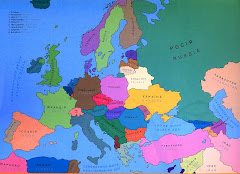 The editing team, Vlad, Sveta, Maria, Ira and Alina, working on tenses in the national anthem.
The editing team, Vlad, Sveta, Maria, Ira and Alina, working on tenses in the national anthem.At our 23 July English Club meeting, a small but lively gathering, we discussed the topic of the day: Verb tenses. What are they? Yes, a continuum of action: present, past, future. Examples: I am a Ukrainian. I was a Ukrainian. I will be a Ukrainian. Some smiles. Others: I see the flag. I saw the flag. I will see the flag. I am busy. I was busy. I will be busy. Yes, great. I am hot. I was hot. I will be hot. A chuckle for this homage to our sweltering heat wave! Several other examples followed.
Okay. Let's use another example: the Ukrainian National Anthem. Eyes rolled!
First we look at the original anthem, which begins “Ukraine is not yet dead." Then we read the revised version approved by the Rada in 2003 as THE national anthem. Everyone agrees the 2003 version is better.
What tense is the revised version in? Future tense. Why? It says “fate WILL smile once more," and "Our enemies WILL vanish...and we too SHALL rule...in a free land."
So, you are not a fortunate, brave, and free land NOW? Hmm. And what about the ending? "We WILL lay down our souls and bodies to obtan freedom," and "we SHALL know" we are the Kozak nation.
You have not fought for freedom yet? You don't know of your proud Cossack past? All this will happen IN THE FUTURE? Hmm. The silence of minds percolating. The wide eyes of wonder. Rising awareness. A light bulb goes off. A flash of insight!
So now a simple exercise: please rewrite the anthem in the present tense. Think about it. Take your time. Do it as a team. In English? Yes, for now.
The team went to work. After 15 minutes, with Alosha playing guitar in the background, a few questions posed, and some good ideas and comments, this is what the team came up with:
"Ukraine’s glory has not perished, nor her freedom.
Upon us, fellow compatriots, fate smiles once more.
Our enemies have vanshed, like dew in the morning sun,
And we now rule, brothers [and sisters], in a free land of our own. We have laid down our souls and bodies to attain our freedom, and we know we are a [proud] kozak nation."
Well, this is an interesting version to think about, to play with, maybe refine some more. Some suggestions are in parenthses. What do you think? Is it more positive, more inspiring, more proud? Yes! "It's STRONGER," Maria says. "Yes, much stronger, just by changing tenses!"
Good work! So now your next assignment: Translate the new present-tense version into Russian, and also Ukrainian (because that is the official national language). It might be hard to do, and hard to coordinate with the tune. We WILL see! Bring your version to next week’s meeting. Also, if you are interested, draft a letter to president Yanukovich telling him about the changes and why you would recommend that his new government and the Rada consider them. Talk about tenses! More doubt than enthusiasm greets this suggestion.
So, you are not a fortunate, brave, and free land NOW? Hmm. And what about the ending? "We WILL lay down our souls and bodies to obtan freedom," and "we SHALL know" we are the Kozak nation.
You have not fought for freedom yet? You don't know of your proud Cossack past? All this will happen IN THE FUTURE? Hmm. The silence of minds percolating. The wide eyes of wonder. Rising awareness. A light bulb goes off. A flash of insight!
So now a simple exercise: please rewrite the anthem in the present tense. Think about it. Take your time. Do it as a team. In English? Yes, for now.
The team went to work. After 15 minutes, with Alosha playing guitar in the background, a few questions posed, and some good ideas and comments, this is what the team came up with:
"Ukraine’s glory has not perished, nor her freedom.
Upon us, fellow compatriots, fate smiles once more.
Our enemies have vanshed, like dew in the morning sun,
And we now rule, brothers [and sisters], in a free land of our own. We have laid down our souls and bodies to attain our freedom, and we know we are a [proud] kozak nation."
Well, this is an interesting version to think about, to play with, maybe refine some more. Some suggestions are in parenthses. What do you think? Is it more positive, more inspiring, more proud? Yes! "It's STRONGER," Maria says. "Yes, much stronger, just by changing tenses!"
Good work! So now your next assignment: Translate the new present-tense version into Russian, and also Ukrainian (because that is the official national language). It might be hard to do, and hard to coordinate with the tune. We WILL see! Bring your version to next week’s meeting. Also, if you are interested, draft a letter to president Yanukovich telling him about the changes and why you would recommend that his new government and the Rada consider them. Talk about tenses! More doubt than enthusiasm greets this suggestion.
I’m not sure this exercise in verb tenses will go anywhere. I do think it provoked some thought and inspired some new ways of looking at language. Most important, it encouraged critical thinking, all-too-rare in the traditional methods of teaching in Ukraine. If this is as far as it goes, that’s not so bad afterall.




























No comments:
Post a Comment